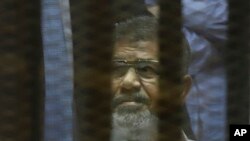An Egyptian court has upheld a death sentence for ousted President Mohamed Morsi and other top Muslim Brotherhood leaders. The men were convicted on charges tied to a mass prison breakout during the 2011 uprising that toppled another president, Hosni Mubarak.
Judge Shaaban al Shami read out the decision to uphold death sentences against half a dozen top Muslim Brotherhood leaders in a move that had been widely expected. The judge had sent the original verdicts to Egypt's mufti, the country's top religious authority, for review.
Those Muslim Brotherhood leaders on trial responded to the decision by chanting slogans against the court from inside the glass enclosed defendants' cage. The men appeared to be smiling broadly and waving their fists in a four-finger salute to symbolize defiance of the ouster of former President Mohamed Morsi and a bloody military operation to evacuate a protest camp.
The Muslim Brotherhood's website condemned the sentences, insisting they were aimed at the legitimacy of the January 2011 revolution and those who participated in it. It claimed Tuesday's sentences “belong on the trash heap of history.”
Morsi, who was elected in Egypt's first democratic election in June 2012, was overthrown by the military a year later after large street protests against him. Tuesday's death sentence against the former Islamist president and his associates is expected to be appealed.
Several trials are still pending against Morsi and top Muslim Brotherhood leaders for a variety of alleged crimes, including leaking intelligence information to foreign countries. Tuesday's verdicts involved allegations of conspiring with outside groups, including Hezbollah and Hamas, to break out of the Wadi Natroun prison in January 2011.
Many analysts believe the death sentences against Morsi and his associates ultimately will not be carried out. Egypt has not executed a Muslim Brotherhood leader since Sayyed Qutb was convicted of plotting to overthrow former President Gamal Abdel Nasser in 1965.
American University of Beirut political scientist Hilal Khashan tells VOA he believes Egypt's leader, Abdel Fattah el Sissi, will not be eager to go against the court of world opinion, which appears to oppose the execution of Mr. Morsi.
"These death sentences ... I do not think they will be commuted, but I do not think they will be carried out. In Egypt, under [President] Sissi issuing tough sentences is aimed at deterring the opponents of the regime. Sissi understands that international public opinion will not [accept] these executions," said Khashan.
Khashan says President Sissi may ultimately “use these executions as a bargaining chip with his opponents to find a way out” of the ongoing political impasse. Egypt's constitution gives the president authority to commute sentences after judicial procedures are complete.




